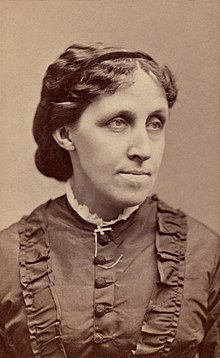Louisa May Alcott (November 29, 1832 – March 6, 1888) was an American novelist, short story writer and poet best known as the author of the novel Little Women (1868) and its sequels Little Men (1871) and Jo's Boys (1886). Raised in New England by her transcendentalist parents, Abigail May and Amos Bronson Alcott, she grew up among many of the well-known intellectuals of the day, such as Ralph Waldo Emerson, Nathaniel Hawthorne, Henry David Thoreau, and Henry Wadsworth Longfellow.
|
Louisa May Alcott
|

Alcott
c. 1870
|
| Born |
November 29, 1832
Germantown, Pennsylvania, U.S. |
| Died |
March 6, 1888 (aged 55)
Boston, Massachusetts, U.S. |
| Resting place |
Sleepy Hollow Cemetery,
Concord, Massachusetts, U.S. |
| Pen name |
A. M. Barnard |
| Occupation |
Novelist |
| Nationality |
American |
| Period |
American Civil War |
| Genre |
Prose, poetry |
| Subject |
Young adult fiction |
| Notable works |
Little Women, Little Men, Jo's Boys, Eight Cousins |
| Signature |
 |
Louisa May Alcott was born in Germantown, Pennsylvania on November 29, 1832. She and her three sisters -- Anna, Elizabeth, and [Abba] May -- were primarily educated by their father, teacher/philosopher A. Bronson Alcott, and raised on the practical Christianity of their mother, Abigail May.Louisa spent her childhood in Boston and in Concord, Massachusetts, where her days were enlightened by visits to Ralph Waldo Emerson’s library, excursions into nature with Henry David Thoreau, and theatricals in the barn at "Hillside" (now "The Wayside"). Like the character of "Jo March" in Little Women, young Louisa was a tomboy. "No boy could be my friend till I had beaten him in a race," she claimed, "and no girl if she refused to climb trees, leap fences . . ."
For Louisa, writing was an early passion. She had a rich imagination and her stories often became the basis of melodramas she and her sisters would act out for friends. Louisa preferred to play the "lurid" parts in these plays -- "the villains, ghosts, bandits, and disdainful queens," as she put it.
At age 15, troubled by the poverty plaguing her family, she vowed, "I will do something by and by. Don’t care what, teach, sew, act, write, anything to help the family; and I’ll be rich and famous and happy before I die, see if I won’t!" Confronting a society that offered little opportunity to women seeking employment, Louisa nonetheless persisted: ". . . I will make a battering-ram of my head and make my way through this rough and tumble world." Whether as a teacher, seamstress, governess, or household servant, for many years Louisa did any work she could find.
Louisa’s career as an author began at the age of eight with poetry, and later short stories that appeared in popular magazines. In 1854, when she was 22, her first book, Flower Fables, was published. A major critical milestone along her literary path was Hospital Sketches (1863), a truthful and poignant account of her service as a Civil War nurse in Washington, DC inspired by the letters she wrote home to her family in Concord.
In 1868, when Louisa was 35 years old, her publisher, Thomas Niles, asked her to write "a girls' story." The 492 pages of Little Women, Part I were dashed off within three months at the desk Louisa's father built for her in her Orchard House bedchamber. The novel is largely based on the coming of age stories of Louisa and her sisters, with many of the domestic experiences inspired by events that actually took place at Orchard House.
Virtually overnight, Little Women was a phenomenal success, primarily due to its timeless storytelling about the first American juvenile heroine, "Jo March," who acted from her own individuality -- a free-thinking, flawed person, rather than the idealized stereotype of feminine perfection then prevalent in children’s fiction.
In all, Louisa published over 30 books and collections of short stories and poems. She died on 6 March 1888, only two days after her father, and is buried in Sleepy Hollow Cemetery in Concord.

